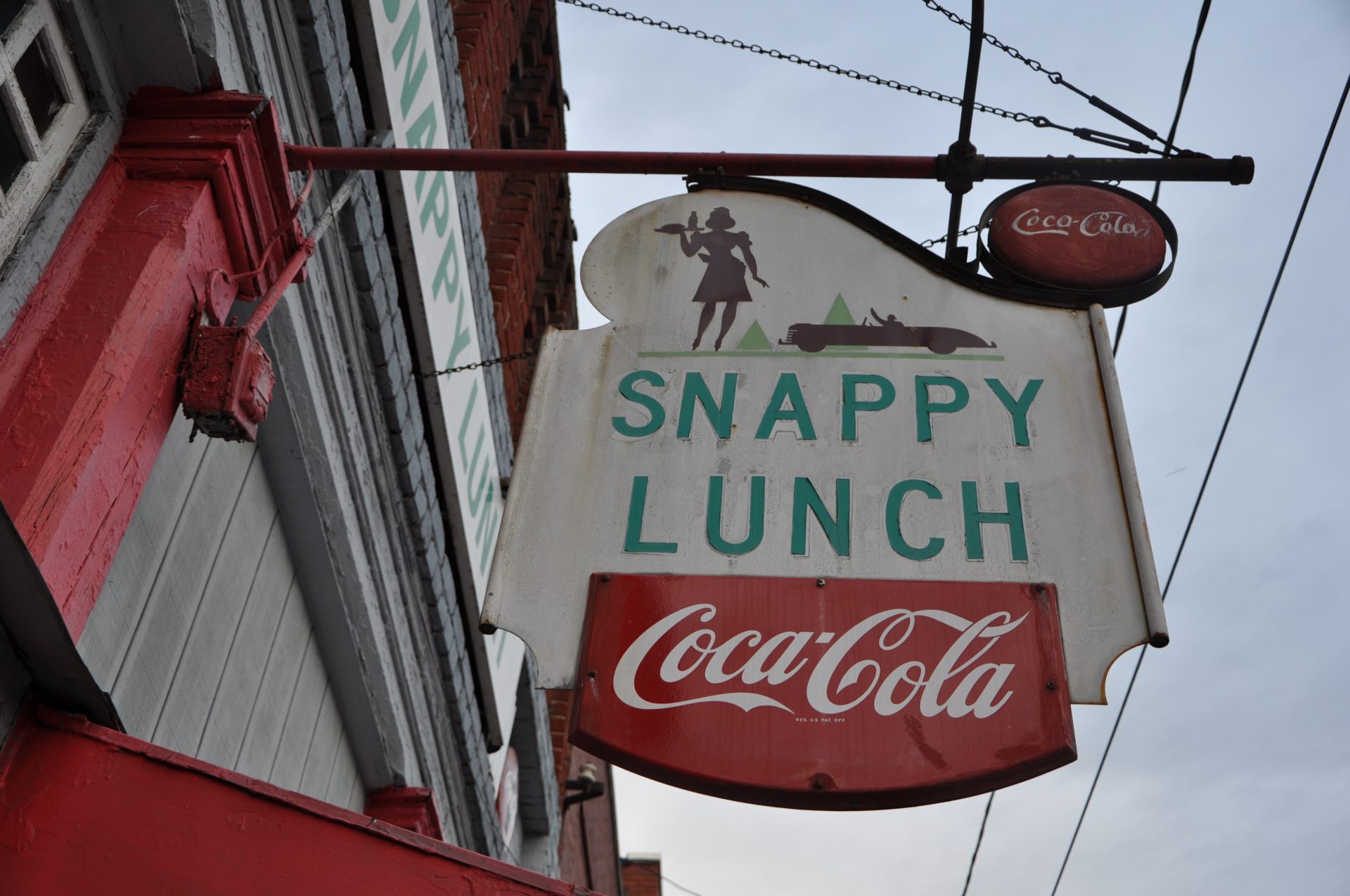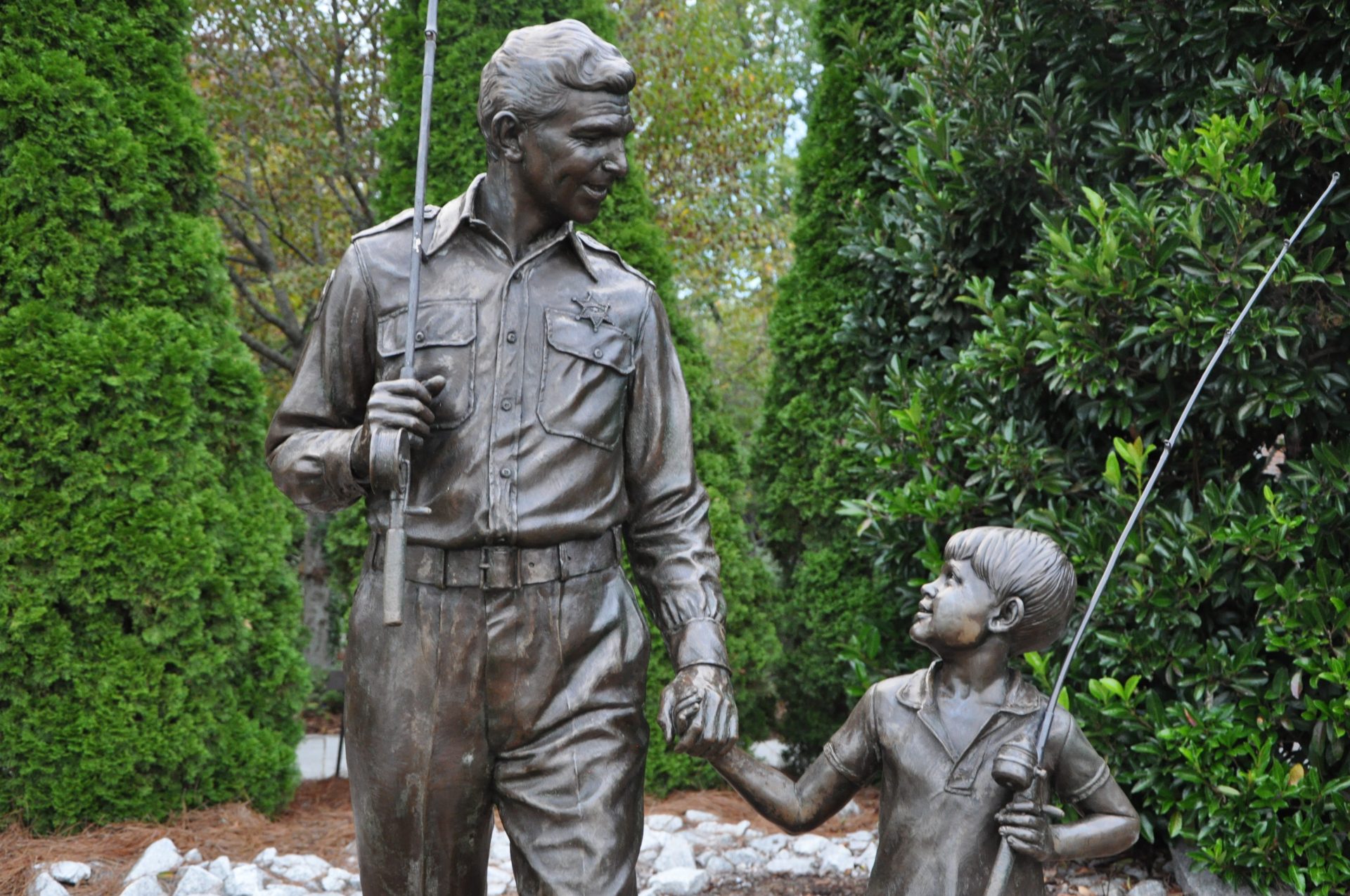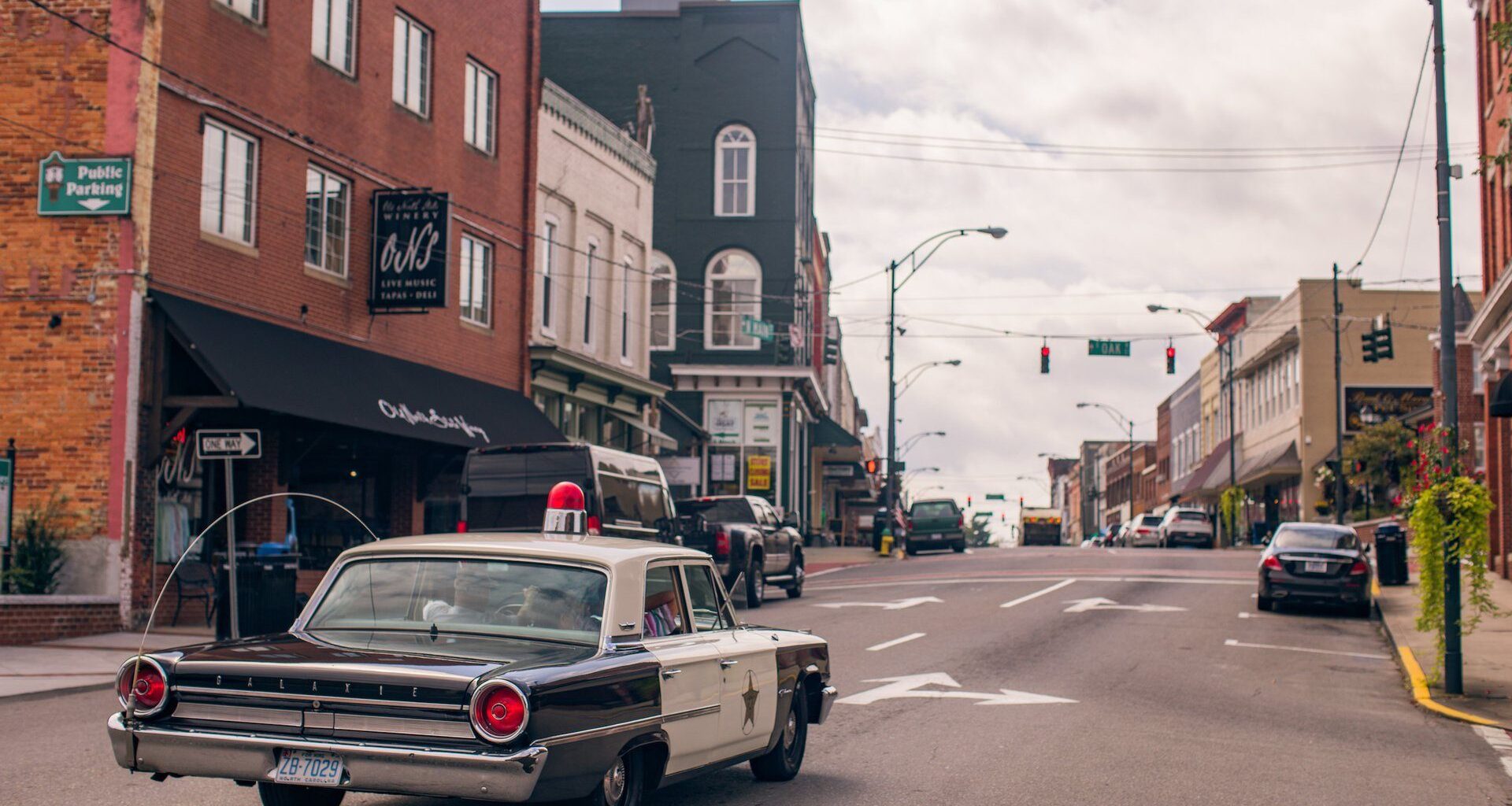It’s Saturday morning, and a crowd is gathering in a parking lot off Main Street. It’s been raining hard for the last hour, and blue-grey clouds still hang low in the sky; a little girl in a pink t-shirt turns her umbrella upside down to catch raindrops. Folks shift to make room for friends and strangers under the eaves and awnings. I’m late, but I don’t have any trouble finding a dry spot near a couple who, like me, just came in from out of town. An Oscar Mayer Wienermobile, one of the American meat producer’s 27-foot-long motorised hot dogs, is idling nearby. Someone is whistling the theme tune from The Andy Griffith Show. It’s 9:06am in Mount Airy, North Carolina. The Mayberry Days parade is about to begin.
We’re here to celebrate The Andy Griffith Show, an enduring element of Americana and one of the most beloved sitcoms in television history. The show aired on CBS from 1960 until 1968; it has been in syndication for the last 54 years and is now available on streaming platforms. It was a ratings powerhouse, consistently ranking among the top seven programmes throughout its run and finishing its final season as the number one show in the Nielsen ratings. Andy Griffith starred in the role of Andy Taylor, a widowed father (his son Opie was played by Ron Howard) and compassionate sheriff in the fictional small town of Mayberry, North Carolina. Don Knotts, who played Griffith’s fumbling deputy, Barney Fife, earned five Emmy Awards for the role. But, as Griffith said in an interview with the Television Academy Foundation, “Mayberry was really the star of the show”.

There’s been a long-running debate about whether Mount Airy, the Old North State town where Griffith was born and raised, is in fact the real-life Mayberry. Griffith, whose working-class upbringing made him an outsider in well-to-do circles, denied it. Still, there’s little doubt that Mount Airy, nestled in the foothills of the Appalachian Mountains, served as a source of inspiration for its fictional counterpart. Beyond proximity to places like Winston-Salem and Pilot Mountain that are mentioned in the occasional episode, Mount Airy and Mayberry share folkways common in the mountain region of North Carolina and nearby Virginia, like old time music, stories from “the Old Country” (the British Isles), and — of course — that good old Mountain Dew (that’s local slang for moonshine).
In any event, no one in Mount Airy is doing anything to discourage the association. The Mayberry Days festival, an annual week-long event honouring the show’s legacy with all kinds of contests, including The Andy Griffith Show trivia and the hay bale toss, is now in its 35th year. Downtown, there’s a beautifully painted mural of Andy Griffith at every stage of life from boyhood to old age, and there are a handful of shops, like Opie’s Candy Store and Floyd’s Barber Shop, that borrow their names from the show.
Earlier in the week, I stopped into a gift shop on the main drag selling hats and magnets featuring The Andy Griffith Show’s regular cast of characters. “Is Mayberry real or is it just TV-land magic?” I asked the store clerk, a good-natured woman in her 50s. She rested an arm on a t-shirt display. “Well,” she said, choosing her words carefully, “I think Mayberry is as real as anyone who has ever needed a second chance. And that’s all of us, isn’t it?” She’s talking about the way the people in the fictional town navigate each other’s flaws, the way the sheriff overlooks or at least tries to understand most offenses. In the jail cell most often occupied by town drunk Otis Campbell, for instance, there’s a rocking chair and a few other decorative comforts. There’s a particular sensitivity within the universe of the show to the material need that still dogs parts of the rural South. There are consistent reminders that, really, you are your brother’s keeper.
I get the idea to race the parade down to Snappy Lunch while the procession is still snaking its way down Main Street. The 100-year-old diner is the only Mount Airy business mentioned by name in The Andy Griffith Show’s 259 episodes, and I imagine throngs of damp festival goers rushing in to try the famous pork chop sandwich. The ceremony is utterly charming: as I hurry by, I see a fleet of gorgeous antique squad cars (Ford Motor Company provided a new model at the start of each season) and a steady stream of wiry would-be deputies doing their best impressions of Barney Fife. A father and son duo are dressed in matching service station uniforms and hats with upturned bills to mimic the show’s iconic gas station attendant Gomer Pyle.
 100-year-old diner. Farahn Morgan
100-year-old diner. Farahn Morgan
Inside Snappy Lunch, a brunette waitress tells me to sit anywhere I like, and I slip into a two-person corner booth facing the window. It’s still early, so I order the one-egg breakfast, which comes with an egg, a choice of bacon or sausage, and a couple of biscuits smothered in sausage gravy. It sets me back $5. The diner is America at its finest. Generous. Fathering. Egalitarian. I notice a spot under a neighbouring seat where the finish is faded, worn from all those who’ve passed through. I think of all the people who’ve sat there — nervous, happy, regretful people. The breadth of all human emotion is there in that spot.
In some pockets of culture, Mayberry has become synonymous with a kind of folksy fantasy town, a nostalgic unreality in which the complexities of the modern age never really break the homespun spell. Created in the tumultuous Sixties, when political violence, civil rights struggles, and foreign conflict dominated the headlines and the airwaves, The Andy Griffith Show offered fans gentler viewing. Perhaps that’s why the show saw a surge in popularity during the Covid pandemic. I remember my family watching it on MeTV during the week my dad spent hospitalised with the virus. And why not? What’s the harm in a little comfort viewing? It beats running the marathon of unrelenting chaos.
While Mayberry may not be completely realistic, it’s not exactly fantasy either. The truth is that, like any place, it has its problems. Before the on-screen action ever begins, Andy loses his wife and Opie his mother. People go to war, some of them don’t come back. Regular people lie and steal and cheat. Politicians change their minds with public opinion. And almost everyone is guilty of vanity and pride. Mayberry’s struggles, like Mount Airy’s, are the struggles of human life. The magic of Mayberry is in its invariably happy endings. There are no problems there that want for solutions, no sorrows that can’t be overcome with mercy, forgiveness, and (on only rare occasions) the long arm of the law. In real life, of course, things don’t always work out that way. Still, compassion and kindness can be profoundly transformative.
“Mayberry has become synonymous with a kind of folksy fantasy town.”
The people who live in Mount Airy embrace that spirit. I wander around town and end up chatting to Julie Russell, who owns an antique and artisan shop called Main Street Market. She has a gentle voice and eyes like full moons, which give her an air of girlish possibility. Julie and her husband came to North Carolina from Mississippi years ago. They’ve faced some struggles. In Mississippi, their house was flooded by Hurricane Katrina. Now, Julie’s husband is dealing with health issues. “Being here in this place,” Julie tells me, “it’s just made a huge difference. It’s amazing how people are willing to help each other, how people have helped us. I just thank God, because I don’t think we’d be here if not for that.”
Before I leave town, I chat with Brandon Holt, a US Air Force Veteran who grew up in Mount Airy and moved back home following his military service. He’s wearing glasses and a black t-shirt with some sort of military insignia printed in gold on one of the sleeves. Brandon tells me he’s a bluegrass musician. He plays guitar in a band with one of his high-school teachers, a guy named Eric. “What’s the band called?” I ask Brandon. “Eric and Friends,” he says. Simple enough, Brandon points out that one of his picks is tucked under the wooden frame of a large mirror that’s hanging in a bottle shop called Uncorked where he is a regular. I tell him I think it’s a nice gesture, and he pulls another pick out of his pocket and puts it in my hand. “Here,” he says, “you can have this one.” I ask him what it’s like to live in Mayberry. He tells me that his decision to move home was spurred by his mother’s untimely death. His dad died just a few months later. “No one here is perfect,” he says, “we have our faults… I know I have mine. But these people would do anything for me and vice versa. They’ve treated me like family. I didn’t expect to stay here, but now that I’m back, I just… I’ll never leave. This is home.”
 Andy and Opie. Farahn Morgan
Andy and Opie. Farahn Morgan
Sometimes, I think The Andy Griffith Show’s bite-sized episodes are little parables. They teach the audience that there’s a better way to live. The fact is that life is not simple. It’s invariably complicated and often tragic. The question is this: what’s to be done about it? And to this, the British writer C.S. Lewis has an answer. “The first action to be taken is to pull ourselves together,” he writes in his post-Second World War essay “On Living in an Atomic Age”. “If we are all going to be destroyed by an atomic bomb, let that bomb when it comes find us doing sensible and human things — praying, working, teaching, reading, listening to music, bathing the children, playing tennis, chatting to our friends over a pint and a game of darts — not huddled together like frightened sheep thinking about bombs. They may break our bodies… but they need not dominate our minds.” There’s wisdom, then, in life’s little rituals. There’s a reason to sit beside a stream with a fishing pole, to go to the local church picnic, to sit around the supper table with all the people we love (even when we don’t agree). Maybe Sunday supper is a revolution.
In the first season of The Andy Griffith Show, there’s an episode called “Stranger in Town” in which an out-of-towner arrives in Mayberry with an almost supernatural knowledge of the local goings-on. He calls the residents by their first names, asks about their families, and pursues a girl he’s never met. The townsfolk are baffled. They guess that he’s a foreign spy or maybe something more sinister. Rejected and defeated, he confesses to the sheriff that he’s a man without a home. He says he heard about Mayberry from an Army buddy, a guy who grew up in the mountain town, who talked all the time about how he couldn’t wait to get back there. The stranger tells Andy he was living in a hotel when he decided he’d make Mayberry his hometown. In a climactic final scene, the townsfolk swarm the police station, hoping to expel the stranger. Andy steps in. “You all are trying to run this boy out of town,” he tells the crowd. “Now what’s his big crime? What’s this boy done to make all of you so mad at him? … Out of all the towns, [this boy] picked Mayberry to be his hometown. It looks to me like you’d be proud to have a fellow think so much of you.” The episode ends with the chastened crowd welcoming the stranger into town.
There’s something powerful about that scene, about watching charity and generosity of spirit take the place of anger and pride. It’s a reminder that humility remains a virtue. There are no perfect towns, no untouched cities. There are only the ones we build and shape. What is America if not thousands upon thousands of hometowns? Maybe Mayberry isn’t a place at all, maybe it’s a choice. Maybe it begins with a single act of human kindness.

